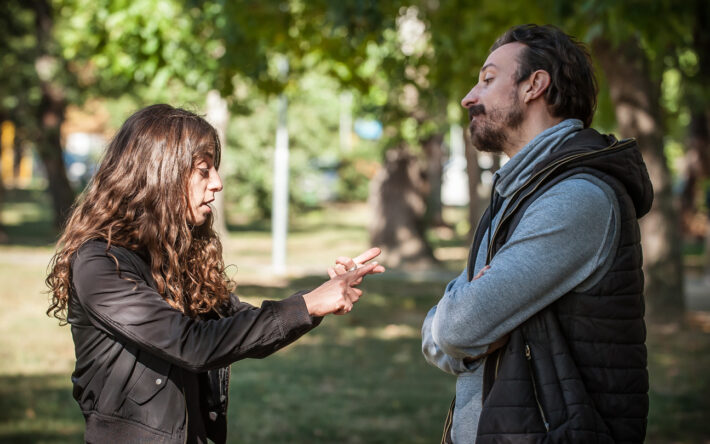Accountability is more than just saying sorry—it requires actually recognising the impact of your actions and doing something about it.

Sadly, not everyone is up for that kind of honesty. Instead of owning up, some people rely on certain phrases that deflect, twist, or flat-out dodge responsibility. These comments might sound casual or even reasonable at first, but underneath, they’re often a way of avoiding blame, protecting ego, or staying in denial. If you hear these regularly (or catch yourself using them), it might be a sign that real accountability is being dodged. Try not to roll your eyes too hard when reading these—many of them will likely be familiar to you.
1. “That’s just how I am.”

This one’s a classic. It sounds like self-awareness, but it’s really about refusing to grow. People who say this are often shutting down the conversation before any real change can happen. They’re acting like personality is set in stone. In reality, we’re all capable of adjusting when we hurt someone, even if it’s unintentional. This one usually just means, “I don’t feel like making the effort.”
2. “You’re too sensitive, you know.”

This flips the script and puts the blame on the other person’s emotional response. Instead of acknowledging that they crossed a line, they make it about your supposed overreaction. It’s a dismissive way to avoid sitting with someone else’s discomfort, and often leaves the other person questioning their own feelings rather than the behaviour that caused them.
3. “I didn’t mean it like that.”

Intent does matter, but it doesn’t erase the impact. This is often used to shut down feedback, as if unintentional harm isn’t still harm. It quickly moves the conversation away from repair and into defence. It’s okay not to mean something in a hurtful way, but it’s still important to listen and learn how your words or actions were received.
4. “Let’s not bring up the past.”

This is often said when someone doesn’t want to revisit their old mistakes, even if those mistakes still have consequences. It can sound like a peacekeeping move, but it usually just protects the person who caused the hurt. Accountability requires reflection, not avoidance. If the past keeps coming up, it’s probably because it still needs to be addressed properly.
5. “You’re making me the bad guy.”

This is a guilt-trip disguised as vulnerability. Instead of taking ownership, the person shifts the focus onto how accused or misunderstood they feel. It centres their emotions instead of the harm caused. It’s a way to avoid having to sit with discomfort, and makes it harder for the person who’s hurt to be heard without being made to feel cruel or dramatic.
6. “I already said I was sorry, what more do you want?”

An apology is a step, not the finish line. When someone throws this out, they’re often frustrated that things aren’t immediately resolved. But a one-time “sorry” doesn’t always fix the damage, especially if nothing else has changed. This line can shut down conversations that still need to happen, especially when the apology was vague, rushed, or never followed by actual behaviour change.
7. “I guess I can’t do anything right!”

This is a sneaky one. It sounds like self-blame, but it’s actually a form of emotional manipulation. Instead of addressing the issue, they spiral into self-pity so the focus moves from the hurt they caused to their hurt feelings. It pulls attention away from what went wrong and makes the other person feel like they have to comfort or reassure them instead. That’s not accountability, it’s deflection.
8. “You’re taking it the wrong way.”

This line implies that the other person is misinterpreting or overreacting, which can make them doubt their experience. It’s a subtle way to rewrite what actually happened. Accountability means listening to how someone experienced something, not trying to control their perspective. This one basically shuts down open and honest conversation before it even starts.
9. “Everyone makes mistakes.”

Yes, that’s true, but it doesn’t mean we all get a free pass. This one is often used to speed through accountability without really stopping to acknowledge what happened or why it mattered. It’s a way of generalising the issue so it feels less personal, but when someone’s still hurting, they’re not looking for a reminder that nobody’s perfect—they’re looking for responsibility and care.
10. “You know I didn’t mean to hurt you.”

This often comes from a well-meaning place, but it can still block true repair. It focuses more on defending the speaker’s character than on hearing the other person’s pain. Just because someone didn’t intend harm doesn’t mean there’s nothing to be accountable for. This can unintentionally make the hurt person feel like their pain is being brushed off.
11. “Well, you did [insert unrelated issue].”

This is classic whataboutism—bringing up something the other person did as a way to avoid taking the spotlight off themselves. It quickly turns the conversation into a blame ping-pong match. Healthy accountability stays focused on the issue at hand, without dragging in unrelated drama. This one is usually about escaping responsibility, not resolving anything.
12. “This is just who I am, take it or leave it.”

Similar to the first one, this is all about refusing growth. It’s a bold way of saying, “I’m not going to do the work to change, so you can deal with the consequences.” When someone says this, they’re not being honest, they’re being rigid. Healthy relationships require flexibility, not ultimatums disguised as self-acceptance.
13. “I was just joking, for goodness’ sake!”

This is often used to cover up passive-aggressive digs or comments that landed badly. Instead of apologising or checking in, the person hides behind humour to avoid discomfort. If the joke hurt someone, the joke didn’t land, and the right thing to do is acknowledge that, not pretend they’re too sensitive for not laughing.
14. “Can we just move on?”

This one pops up when someone’s uncomfortable sitting in the tension. It sounds reasonable, like they’re trying to keep the peace, but it often comes too soon, before the issue’s been worked through. Moving on only works if both people feel heard and respected. If one person is still holding pain and the other’s rushing past it, the damage just stays buried.
15. “I didn’t think it would matter, to be honest.”

This one might sound innocent, but it speaks volumes about awareness (or lack of it). Saying this is basically admitting they didn’t think about how their actions would affect you, which is part of the problem in the first place. If someone wants to be taken seriously when they say they care, they need to pay attention to the impact of their choices. Brushing it off like it was too small to notice just adds to the hurt.




